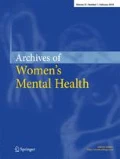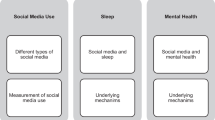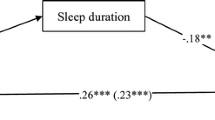Abstract
Our goal was to examine associations of infant sleep and feeding patterns with maternal sleep and mood among women at risk for postpartum depression. Participants were 30 women (age ± SD = 28.3 ± 5.1 years) with a history of MDD (but not in a mood episode at enrollment) who completed daily sleep diaries, wore wrist actigraphs to estimate sleep, and had their mood assessed with the Hamilton Depression Rating Scale (HAM-D-17) during four separate weeks of the perinatal period (33 weeks pregnancy and weeks 2, 6, and 16 postpartum). They logged their infants’ sleep and feeding behaviors daily and reported postnatal stress on the Childcare Stress Inventory (CSI) at week 16. Mothers’ actigraphically estimated sleep showed associations with infant sleep and feeding patterns only at postpartum week 2. Shorter duration of the longest infant-sleep bout was associated with shorter maternal sleep duration (p = .02) and lower sleep efficiency (p = .04), and maternal sleep efficiency was negatively associated with the number of infant-sleep bouts (p = .008) and duration of infant feeding (p = .008). Neither infant sleep nor feeding was associated with maternal sleep at 6 or 16 weeks, but more disturbed infant sleep and more frequent feeding at 6 weeks were associated with higher HAM-D scores at 6 and 16 weeks and higher CSI scores. Sleep in the mother-infant dyad is most tightly linked in the early postpartum weeks, but mothers continue to experience disturbed sleep and infant sleep and feeding behaviors continue to be associated with mothers’ depressive symptoms and stress ratings as long as 16 weeks postpartum. These data imply that interventions designed to improve maternal sleep and postpartum mood should include both mothers and infants because improving infant sleep alone is not likely to improve maternal sleep, and poor infant sleep is linked to postpartum depression and stress.


Similar content being viewed by others
References
Acebo C, Thoman EB (1995) Role of infant crying in the early mother-infant dialogue. Physiol Behav 57:541–547
Anders TF, Halpern LF, Hua J (1992) Sleeping through the night: a developmental perspective. Pediatrics 90:554–560
Armitage R, Flynn H, Hoffmann R, Vazquez D, Lopez J, Marcus S (2009) Early developmental changes in sleep in infants: the impact of maternal depression. Sleep 32:693–696
Basner M, Dinges DF (2012) An adaptive-duration version of the PVT accurately tracks changes in psychomotor vigilance induced by sleep restriction. Sleep 35:193–202. doi:10.5665/sleep.1620
Beebe KR, Lee KA (2007) Sleep disturbance in late pregnancy and early labor. J Perinat Neonatal Nurs 21:103–108. doi:10.1097/01.JPN.0000270626.66369.26
Ciarleglio CM, Axley JC, Strauss BR, Gamble KL, McMahon DG (2011) Perinatal photoperiod imprints the circadian clock. Nat Neurosci 14:25–27. doi:10.1038/nn.2699
Coble PA, Reynolds CF 3rd, Kupfer DJ, Houck PR, Day NL, Giles DE (1994) Childbearing in women with and without a history of affective disorder. II. Electroencephalographic sleep. Compr Psychiatry 35:215–224
Cutrona CE (1983) Causal attributions and perinatal depression. J Abnorm Psychol 92:161–172
Dennis CL, Ross L (2005) Relationships among infant sleep patterns, maternal fatigue, and development of depressive symptomatology. Birth 32:187–193. doi:10.1111/j.0730-7659.2005.00368.x
Doan T, Gardiner A, Gay CL, Lee KA (2007) Breast-feeding increases sleep duration of new parents. J Perinat Neonatal Nurs 21:200–206. doi:10.1097/01.JPN.0000285809.36398.1b
Doan T, Gay CL, Kennedy HP, Newman J, Lee KA (2014) Nighttime breastfeeding behavior is associated with more nocturnal sleep among first-time mothers at one month postpartum. J Clin Sleep Med 10:313–319. doi:10.5664/jcsm.3538
Doering JJ (2013) The physical and social environment of sleep in socioeconomically disadvantaged postpartum women. J Obstet Gynecol Neonatal Nurs 42:E33–E43. doi:10.1111/j.1552-6909.2012.01421.x
Douglas PS, Hill PS (2013) Behavioral sleep interventions in the first six months of life do not improve outcomes for mothers or infants: a systematic review. J Dev Behav Pediatr JDBP 34:497–507. doi:10.1097/DBP.0b013e31829cafa6
Driver HS, Shapiro CM (1992) A longitudinal study of sleep stages in young women during pregnancy and postpartum. Sleep 15:449–453
First M, Spitzer R, Gibbon M, Williams J (2002) Structured clinical interview for DSM-IV-TR axis 1 disorders, research version, patient edition (SCID-I/P). Biometrics Research, New York State Psychiatric Institute, New York
Gay CL, Lee KA, Lee SY (2004) Sleep patterns and fatigue in new mothers and fathers. Biol Res Nurs 5:311–318. doi:10.1177/1099800403262142
Goyal D, Gay CL, Lee KA (2007) Patterns of sleep disruption and depressive symptoms in new mothers. J Perinat Neonat Nurs 21:123–129
Goyal D, Gay C, Lee K (2009) Fragmented maternal sleep is more strongly correlated with depressive symptoms than infant temperament at three months postpartum. Arch Womens Ment Health 12:229–237. doi:10.1007/s00737-009-0070-9
Hamilton M (1960) A rating scale for depression. J Neurol Neurosurg Psychiatry 23:56–62
Hedman C, Pohjasvaara T, Tolonen U, Suhonen-Malm AS, Myllyla VV (2002) Effects of pregnancy on mothers’ sleep. Sleep Med 3:37–42
Hiscock H, Wake M (2001) Infant sleep problems and postnatal depression: a community-based study. Pediatrics 107:1317–1322
Hiscock H, Wake M (2002) Randomised controlled trial of behavioural infant sleep intervention to improve infant sleep and maternal mood. BMJ 324:1062–1065
Hiscock H, Bayer J, Gold L, Hampton A, Ukoumunne OC, Wake M (2007) Improving infant sleep and maternal mental health: a cluster randomised trial. Arch Dis Child 92:952–958. doi:10.1136/adc.2006.099812
Horiuchi S, Nishihara K (1999) Analyses of mothers’ sleep logs in postpartum periods. Psychiatry Clin Neurosci 53:137–139
Insana SP, Williams KB, Montgomery-Downs HE (2013) Sleep disturbance and neurobehavioral performance among postpartum women. Sleep 36:73–81. doi:10.5665/sleep.2304
Karacan I, Williams RL, Hursch CJ, McCaulley M, Heine MW (1969) Some implications of the sleep patterns of pregnancy for postpartum emotional disturbances. Br J Psychiatry 115:929–935
Kendall-Tackett K, Cong Z, Hale TW (2013) Depression, sleep quality, and maternal well-being in postpartum women with a history of sexual assault: a comparison of breastfeeding, mixed-feeding, and formula-feeding mothers. Breastfeed Med 8:16–22. doi:10.1089/bfm.2012.0024
Kennedy HP, Gardiner A, Gay C, Lee KA (2007) Negotiating sleep: a qualitative study of new mothers. J Perinat Neonatal Nurs 21:114–122. doi:10.1097/01.JPN.0000270628.51122.1d
Lee KA, Gay CL (2004) Sleep in late pregnancy predicts length of labor and type of delivery. Am J Obstet Gynecol 191:2041–2046. doi:10.1016/j.ajog.2004.05.086
Lee KA, Gay CL (2011) Can modifications to the bedroom environment improve the sleep of new parents? Two randomized controlled trials. Res Nurs Health 34:7–19. doi:10.1002/nur.20413
Lee SY, Lee KA (2007) Early postpartum sleep and fatigue for mothers after cesarean delivery compared with vaginal delivery: an exploratory study. J Perinat Neonatal Nurs 21:109–113. doi:10.1097/01.JPN.0000270627.73993.b0
Lee KA, McEnany G, Zaffke ME (2000a) REM sleep and mood state in childbearing women: sleepy or weepy? Sleep 23:877–885
Lee KA, Zaffke ME, McEnany G (2000b) Parity and sleep patterns during and after pregnancy. Obstet Gynecol 95:14–18
Mindell JA, Jacobson BJ (2000) Sleep disturbances during pregnancy. J Obstet Gynecol Neonatal Nurs 29:590–597
Mindell JA, Du Mond CE, Sadeh A, Telofski LS, Kulkarni N, Gunn E (2011) Long-term efficacy of an internet-based intervention for infant and toddler sleep disturbances: one year follow-up. J Clin Sleep Med 7:507–511. doi:10.5664/JCSM.1320
Montgomery-Downs HE, Clawges HM, Santy EE (2010a) Infant feeding methods and maternal sleep and daytime functioning. Pediatrics 126:e1562–e1568. doi:10.1542/peds.2010-1269
Montgomery-Downs HE, Insana SP, Clegg-Kraynok MM, Mancini LM (2010b) Normative longitudinal maternal sleep: the first 4 postpartum months. Am J Obstet Gynecol 203(465):e461–e467. doi:10.1016/j.ajog.2010.06.057
Muscat T, Obst P, Cockshaw W, Thorpe K (2014) Beliefs about infant regulation, early infant behaviors and maternal postnatal depressive symptoms. Birth 41:206–213. doi:10.1111/birt.12107
Nishihara K, Horiuchi S (1998) Changes in sleep patterns of young women from late pregnancy to postpartum: relationships to their infants’ movements. Percept Mot Skills 87:1043–1056
Parry BL, Curran ML, Stuenkel CA, Yokimozo M, Tam L, Powell KA, Gillin JC (2000) Can critically timed sleep deprivation be useful in pregnancy and postpartum depressions? J Affect Disord 60:201–212
Quillin SI, Glenn LL (2004) Interaction between feeding method and co-sleeping on maternal-newborn sleep. J Obstet Gynecol Neonatal Nurs 33:580–588
Sadeh A, Sharkey KM, Carskadon MA (1994) Activity-based sleep-wake identification: an empirical test of methodological issues. Sleep 17:201–207
Signal TL, Gander PH, Sangalli MR, Travier N, Firestone RT, Tuohy JF (2007) Sleep duration and quality in healthy nulliparous and multiparous women across pregnancy and post-partum. Aust N Z J Obstet Gynaecol 47:16–22. doi:10.1111/j.1479-828X.2006.00672.x
Stremler R, Hodnett E, Lee K, MacMillan S, Mill C, Ongcangco L, Willan A (2006) A behavioral-educational intervention to promote maternal and infant sleep: a pilot randomized, controlled trial. Sleep 29:1609–1615
Stremler R, Hodnett E, Kenton L, Lee K, Weiss S, Weston J, Willan A (2013) Effect of behavioural-educational intervention on sleep for primiparous women and their infants in early postpartum: multisite randomised controlled trial. BMJ 346:f1164. doi:10.1136/bmj.f1164
Swain AM, O’Hara MW, Starr KR, Gorman LL (1997) A prospective study of sleep, mood, and cognitive function in postpartum and nonpostpartum women. Obstet Gynecol 90:381–386
Swanson LM, Flynn H, Adams-Mundy JD, Armitage R, Arnedt JT (2013) An open pilot of cognitive-behavioral therapy for insomnia in women with postpartum depression. Behav Sleep Med 11:297–307. doi:10.1080/15402002.2012.683902
Vgontzas AN, Zoumakis E, Bixler EO, Lin HM, Follett H, Kales A, Chrousos GP (2004) Adverse effects of modest sleep restriction on sleepiness, performance, and inflammatory cytokines. J Clin Endocrinol Metab 89:2119–2126. doi:10.1210/jc.2003-031562
Wilkie G, Shapiro CM (1992) Sleep deprivation and the postnatal blues. J Psychosom Res 36:309–316
Wolfson A, Lacks P, Futterman A (1992) Effects of parent training on infant sleeping patterns, parents’ stress, and perceived parental competence. J Consult Clin Psychol 60:41–48
Wolfson AR, Crowley SJ, Anwer U, Bassett JL (2003) Changes in sleep patterns and depressive symptoms in first-time mothers: last trimester to 1-year postpartum. Behav Sleep Med 1:54–67
Acknowledgements
This study was funded by K23-MH086689 from the National Institutes of Health and a J. Christian Gillin Award from the Sleep Research Society Foundation to KMS and a grant from the Brown University/Women and Infants Hospital National Center of Excellence in Women’s Health Seed Grant to KMS and TP. The authors thank Julie Quattrucci, Aubree Hoepper, and Emily Mepham for assistance with data collection. We acknowledge Christine Acebo, PhD and Mary A. Carskadon, PhD for helpful comments on the manuscript. Finally, we are grateful to the study participants and their families for participating in our study.
Ethical standards
This study was performed in accordance with the ethical standards laid down in the 1964 Declaration of Helsinki and its later amendments. Participants gave informed consent prior to their inclusion in the study and were paid for their participation.
Conflict of interest
The authors declare that they have no conflict of interest.
Author information
Authors and Affiliations
Corresponding author
Rights and permissions
About this article
Cite this article
Sharkey, K.M., Iko, I.N., Machan, J.T. et al. Infant sleep and feeding patterns are associated with maternal sleep, stress, and depressed mood in women with a history of major depressive disorder (MDD). Arch Womens Ment Health 19, 209–218 (2016). https://doi.org/10.1007/s00737-015-0557-5
Received:
Accepted:
Published:
Issue Date:
DOI: https://doi.org/10.1007/s00737-015-0557-5




